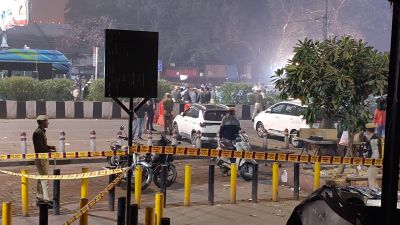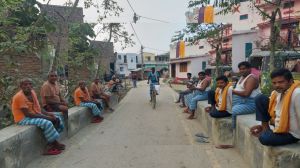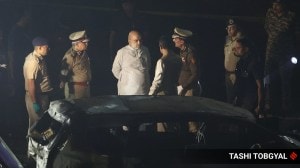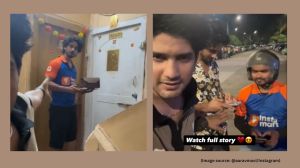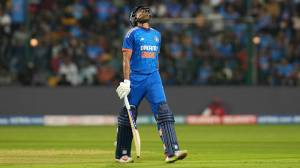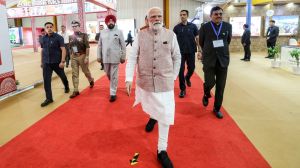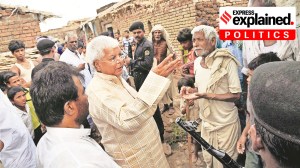Meet the MP who was not disqualified: Gujarat BJP’s Naranbhai Bhikhabhai Kachhadiya
Cong asks why the Amreli MP saw no action over the 16 days in 2016 his conviction stood, till relief from SC; Kachhadiya says, “No bias, I went to court immediately, why didn't Rahul?”
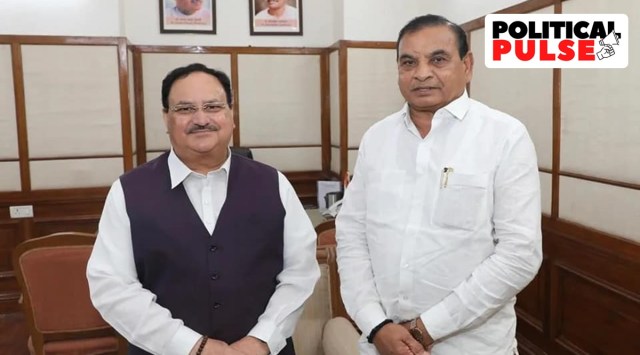 Amreli MP Naranbhai Bhikhabhai Kachhadiya and BJP national president JP Nadda (Facebook: MP Naranbhai Kachhadiya)
Amreli MP Naranbhai Bhikhabhai Kachhadiya and BJP national president JP Nadda (Facebook: MP Naranbhai Kachhadiya) THE CONGRESS has accused the government of double standards, saying while Rahul Gandhi had been disqualified as MP with “lightning speed”, a Gujarat MP convicted in a criminal case had not faced the same action.
On April 13, 2016, BJP Amreli MP Naranbhai Bhikhabhai Kachhadiya was awarded a three-year jail term by a local court in Amreli. He got a stay on his conviction only 16 days later, but the office of the Speaker at the time, Sumitra Mahajan, did not move to disqualify him.
In the 2019 Lok Sabha elections, Kachhadiya, 68, a farmer and Patidar leader – and an MP since 2009 – was re-elected from Amreli on a BJP ticket.
Rahul Gandhi was disqualified a day after his conviction and sentencing for two years in a defamation case, on the grounds that the process of his removal as a parliamentarian began automatically as soon as he was sentenced for a period of two years.
On Tuesday, Congress leader in the Lok Sabha Adhir Ranjan Chowdhury wrote to Speaker Om Birla seeking a discussion on Rahul’s disqualification, citing Kachhadiya’s case.
Kachhadiya had been convicted on the charge of assaulting a Dalit doctor on duty at a government hospital, with the court giving him 30 days to appeal. The Amreli MP moved the Gujarat High Court first, but while it suspended his sentence, it did not stay his conviction – needed to stall his disqualification as a parliamentarian – primarily on the ground that an exceptional case was not made out for a stay.
Finally, Kachhadiya got relief from the Supreme Court on April 29, 2016.
Lok Sabha Secretariat sources acknowledged that there had been a delay in issuing the notification disqualifying the Gujarat MP in 2016. Although Congress leaders from Gujarat approached President Ram Nath Kovind, Speaker Sumitra Mahajan, and the Election Commission seeking his disqualification soon after he was convicted by the trial court, a source said, there was no movement.
The Congress again sought action when the Gujarat High Court refused to grant the MP relief.
“Kachhadiya was acquitted on April 29, 16 days after the conviction by the lower court. All through the process he remained an MP. He survived as MP and was again given a ticket by the BJP in 2019,” said a source.
Sumitra Mahajan told The Indian Express that she couldn’t recall the exact details of the case and would have to go through records.
Kachhadiya argued that his case was different as he “went through the legal system” and that the Congress “does not have faith in institutions of the country”. “Adhir Ranjan Chowdhury, Congress president Mallikarjun Kharge, its Rajya Sabha MP from Gujarat Shaktisinh Gohil etc have been making different statements since this (Rahul’s disqualification) happened. India is the world’s biggest democracy and India’s Constitution is the world’s largest Constitution, but Congress leaders don’t have faith in the Constitution, judiciary or law-enforcement agencies,” Kachhadiya told The Indian Express.
He added: “I don’t deny that I was convicted. But I applied to the High Court soon after, and when the High Court didn’t grant me relief, I immediately moved the Supreme Court. But instead of appealing against his conviction, Rahul chose to state that he was not Savarkar and that he won’t apologise because he is Gandhi.”
There was no bias in the disqualification process not being initiated against him, the BJP MP asserted. “Everyone, from the last man living in the smallest of villages to the most powerful man of this country, has to abide by the legal system… The crux of the matter is that one has to appeal against a guilty verdict immediately, and I did that immediately… But Rahul Gandhi said he won’t apologise. It doesn’t work that way. If we have done something wrong, we have to admit that and say sorry.”
Dr Dhanji Dabhi, posted at Amreli Civil Hospital, had accused Kichhadiya and five others, including BJP office-bearers, of assaulting him on January 1, 2013, when Kachhadiya was a first-term MP. An FIR was lodged against Kachhadiya under IPC Sections 332 (voluntarily causing hurt) and 506 (2) (criminal intimidation), apart from others, as well as under the SC/ST (Prevention of Atrocities) Act.
The other accused were not booked under the SC/ST Act, and were sentenced for six months.
In his plea to the Supreme Court, Kachhadiya said he and the other accused had reached a compromise with Dr Dabhi on April 1, 2016 – 12 days before his conviction by the lower court. The Supreme Court Bench of Justices Madan Lokur and N V Ramana in its order noted that “adverse consequences will certainly follow not only (for) the appellant but also his constituents in case the conviction remains” and that “the impact would virtually be irreparable”. It then proceeded to quash only Kachhadiya’s conviction among the accused, while asking him to pay Rs 5 lakh to the victim.
(Rahul incidentally has sought relief from conviction in the Sessions Court on similar grounds.)
The apex court also took into account that the MP had been acquitted of a more serious offence under the SC/ST Act and said the trial court had given “no special reason” for awarding the maximum punishment to him.
The appeals of the other accused are still pending before the Gujarat High Court, with the next hearing on April 11.



- 01
- 02
- 03
- 04
- 05


